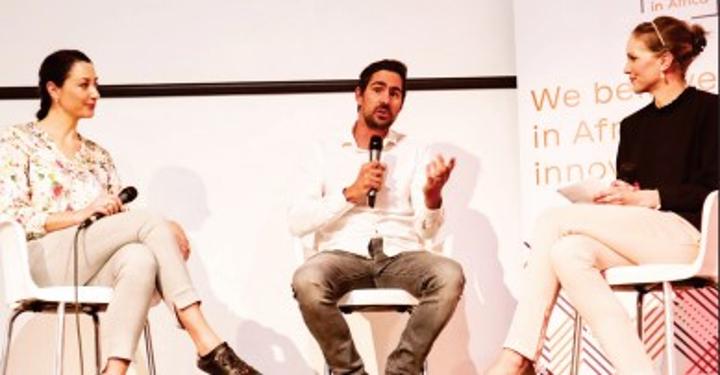Africa-Press – Namibia. WHEN asking start-up founders about their biggest challenges, securing funding usually ranks among the top three. In this week’s edition of ‘Start-Up News’, GIZ Namibia’s digital ambassador Meike Neitz (MK) chats to PayToday’s founder, Chris Botha (CB), and to Andrea Barry (AB), the strategy director at Pupkewitz, about how PayToday started making waves.
Compared to other markets, especially corporate engagement and investment in start-ups are very low. In Germany, all big companies and even medium-sized businesses, as well as family offices are invested in different funds, invest in start-ups themselves, or have their own incubation programmes. High net-worth individuals invest as business angels in start-ups, and often mentor several young entrepreneurs for many years.
In the Namibian context, the journey of PayToday’s founders, Naudé Muller and Chris Botha, who were able to secure investments from both a local corporate (the Pupkewitz Group) and a large financial institution (Nedbank), is one of the most fascinating ones, and I strongly believe it could serve as a blueprint to others.
MN: Chris, tell us a bit about your background and the beginning of PayToday? CB: I was born in Namibia and I’ve known my co-founder Naudé since we were kids. I studied to be a chartered accountant at Stellenbosch University, but I’ve always been enthusiastic about tech. So when I came back, our first start-up idea was an MP3 music download platform.
It was a great business idea, but we found out it was also illegal, so that was the end of that. So, only after I came back from Europe, where I lived for seven years working at Deloitte, we got to think seriously about founding our own tech business. Our first start-up was StayToday, which was an online accommodation website, and it was Nedbank who joined us here early on as a marketing partner.
That got us really interested in fintech and delivering better financial services, and we came up with the idea of PayToday. In 2017 we launched the PayToday app. MN: How did you get in touch with Pupkewitz?
CB: While I always had Pupkewitz on my radar, as Andrea was also a school friend, how it actually came about was quite a funny coincidence. I met the former chief executive officer of Pupkewitz at a Ride for Rhinos charity cycling event where I was the official photographer.
As we were at that time looking for investors, I just pitched our idea to him while we were driving around in Damaraland. He said he’d be happy to help us change the world, and two months later the investment board approved it. MN: It took only two months? That is so fast!
CB: Yes, it was really quick from the first engagement until we actually saw the money enter the account. And I have to say it’s been a great journey. I’ve had so many mentors throughout the years, and most of them I got through Pupkewitz and Andrea in particular.
The Pupkewitz team came on board at a time when nobody believed in us, and got us to the stage where a big international company like Nedbank would be interested to invest.
MN: Andrea, tell us a bit about yourself. AB: I grew up in Namibia and lived in the same street as my grandfather, Harold Pupkewitz, with whom I had a very close relationship.
After completing school in Windhoek, I went on to study actuarial science at Stellenbosch University, and later qualified as a fellow of the Actuarial Society of South Africa.
My proudest academic achievement, however, was my acceptance to Harvard Business School as the first Namibian to complete their full-time master’s of business administration.
Putting Namibia on the international map was one of my key objectives. My work experience has seen me fill senior roles in insurance in South Africa in product development, capital solvency, sales and business intelligence.
Today, I operate from London as a director of the Pupkewitz Group driving strategy, corporate development, and the recruitment of top management. I chair the operational boards of a number of the subsidiary businesses, and sit on all of the board subcommittees. I’m also a trustee of the Pupkewitz Foundation, the corporate social investment arm of the Pupkewitz Group.
MN: What strategic interest did Pupkewitz have in PayToday? AB: At Pupkewitz we’ve been focused on diversifying our business for some time now. So, we’ve explored how we can continue to invest in Namibia by looking beyond our current operations. While there are opportunities to expand cross-border, Namibia will remain our first love.
While there are limited direct synergies between PayToday and our businesses, we wanted to bring two technically, digitally strong, future-focused founders into Pupkewitz to positively influence our existing business regarding the digital revolution.
MN: Why is corporate investment in Namibian start-ups so scarce? AB: First of all, we need to understand how Pupkewitz being a family business allows us to operate. We have a broad mandate in terms of the businesses we are able to get involved with. While we have firm governance in place, we are able to decide quickly where we’d like to invest, and that gives us manoeuvrability in the space.
Further, we understand the importance of small and medium enterprises (SMEs) in the Namibian market, both as a family and as a company. All of our businesses operate within ecosystems in which many SMEs participate, and we’ve invested a lot over the years in mentoring and nurturing these small businesses.
We understand their importance as a source of employment creation and more. Supporting a local Namibian tech start-up such as PayToday is another way in which this business ethos has played out.
In terms of why more corporates don’t get involved in start-ups, it takes a certain risk appetite to invest in businesses that are pre-revenue, and perhaps that’s not within the mandate of many corporates.
Investing in a young business requires not only an investment of funds, but also time and resources. MN: Andrea and Chris, what advice would you give other founders of start-ups, and corporates investing in a start-up?
CB: The best advice I have for start-ups is to focus less on the idea and more on the execution thereof. There’s a great quote by Mike Tyson: “Everyone’s got a plan until they get punched in the face.”
Get early validation for your product or service, not only by friends, family and fools, but also from the real customers out there in the market before approaching companies.
AB: We’ve learnt as a team to always have a strong focus on solving a real pain point, and having a thorough understanding of the job to be done, which causes a consumer to adopt a new innovation.
This is critical because it determines what people are willing to pay for. Furthermore, processes like design thinking are very powerful in validating a new product and complement concepts such as lean start-up.
In terms of how to invest, the tranched funding approach is critical. That means being very clear strategically on where you’re headed and breaking that goal down into smaller steps, where funding is provided per step. MN: Andrea, how much of a partner versus ‘just investor’ are you?
AB: That has changed over time based on what PayToday has needed from us. As Chris mentioned, we have provided much more than just funding and the presence of a strong backer to the PayToday brand. The Pupkewitz Group has a variety of assets that PayToday has been able to draw on.
For example, the PayToday team works from Pupkewitz’s offices. Pupkewitz also has customers, suppliers, employees and other stakeholders with whom a start-up can engage to test their thinking and roll out their product. MN: How did Nedbank enter the game?
CB: As mentioned earlier, Nedbank was involved from very early on, when we launched StayToday in 2011, and we’ve always remained in touch. Following the investment of Pupkewitz they also decided to buy into PayToday with a minority share this year. MN: How can we imagine stakeholder engagement on a day-to-day basis?
CB: We do check-in from time to time, but everyone has a busy schedule. One key component of cultivating a successful start-up-corporate relationship is to actually not get overly involved or micro-manage, but to have the trust in the founders that they’ll work it out and know what’s best for their business.
And then we have clear milestones we need to reach, which helps us prioritise and stay focused, and the same applies for Nedbank. And really that’s been one of the biggest blessings of this journey: People who really have confidence in us.
For More News And Analysis About Namibia Follow Africa-Press






